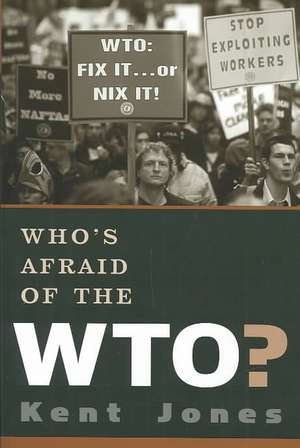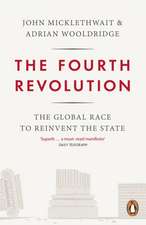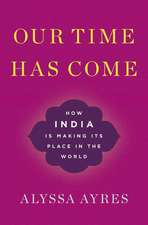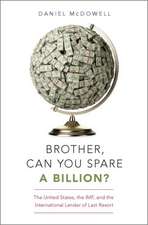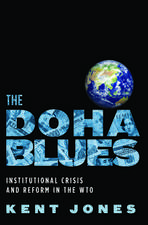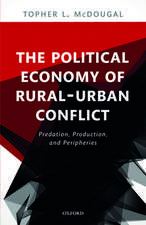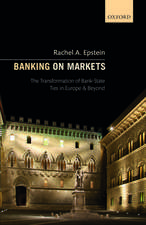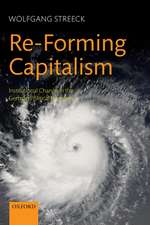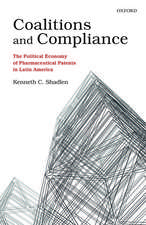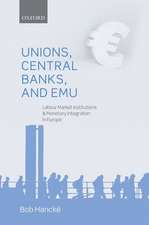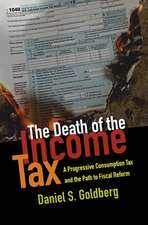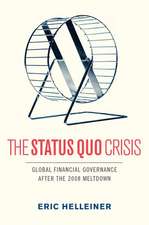Who's Afraid of the WTO?
Autor Kent Jonesen Limba Engleză Hardback – 26 feb 2004
Preț: 346.42 lei
Preț vechi: 424.86 lei
-18% Nou
Puncte Express: 520
Preț estimativ în valută:
66.31€ • 72.05$ • 55.74£
66.31€ • 72.05$ • 55.74£
Carte tipărită la comandă
Livrare economică 10-16 aprilie
Preluare comenzi: 021 569.72.76
Specificații
ISBN-13: 9780195166163
ISBN-10: 0195166167
Pagini: 248
Ilustrații: 7 cartoons
Dimensiuni: 163 x 241 x 22 mm
Greutate: 0.49 kg
Editura: Oxford University Press
Colecția OUP USA
Locul publicării:New York, United States
ISBN-10: 0195166167
Pagini: 248
Ilustrații: 7 cartoons
Dimensiuni: 163 x 241 x 22 mm
Greutate: 0.49 kg
Editura: Oxford University Press
Colecția OUP USA
Locul publicării:New York, United States
Recenzii
"Kent Jones book, by providing an informed, as well as a simple, explanation of the rationale and workings of the multilateral trading system, makes clear that those who oppose globalization in their pursuit of good causes have actually picked the wrong adversary." Ernesto Zedillo, Former President of Mexico, Director of the Yale Center for the Study of Globalization
"The WTO has attracted an unusually high share of the anti-globalization rhetoric since Seattle. Much of it is tendentious and ill-informed and even comes from organizations such as the UNDP and NGOs such as OXFAM who are suffering from mission-creep. Any attempt to refute these unwarranted allegations is welcome. Kent Jones' efforts is therefore laudable; that it succeeds is doubly pleasing." - Jagdish Bhagwati, University Professor, Columbia University
"Professor Jones' excellent study should serve to dispel many of the fears and misconceptions surrounding the WTO, at least on part of those who are prepared to learn about that Organization. He provides a clear description of what the WTO is, namely an intergovernmental organization that works on the basis of consensus, as well as what it is not, namely a self-motivated juggernaut taking decisions on its own and imposing them on poor countries. He also makes clear that the process of trade liberalization based on the WTO is a critical element, though not sufficient in and of itself, in achieving economic development and the attendant increase in living standards, labor rights, and environmental protection in the developing world. Finally, he provides some excellent suggestions for WTO members on how they can supplement its work, outside the WTO itself, to satisfy the concerns expressed by some of its critics." - Thomas M. T. Niles, President, United States Council for International Business
"The WTO has attracted an unusually high share of the anti-globalization rhetoric since Seattle. Much of it is tendentious and ill-informed and even comes from organizations such as the UNDP and NGOs such as OXFAM who are suffering from mission-creep. Any attempt to refute these unwarranted allegations is welcome. Kent Jones' efforts is therefore laudable; that it succeeds is doubly pleasing." - Jagdish Bhagwati, University Professor, Columbia University
"Professor Jones' excellent study should serve to dispel many of the fears and misconceptions surrounding the WTO, at least on part of those who are prepared to learn about that Organization. He provides a clear description of what the WTO is, namely an intergovernmental organization that works on the basis of consensus, as well as what it is not, namely a self-motivated juggernaut taking decisions on its own and imposing them on poor countries. He also makes clear that the process of trade liberalization based on the WTO is a critical element, though not sufficient in and of itself, in achieving economic development and the attendant increase in living standards, labor rights, and environmental protection in the developing world. Finally, he provides some excellent suggestions for WTO members on how they can supplement its work, outside the WTO itself, to satisfy the concerns expressed by some of its critics." - Thomas M. T. Niles, President, United States Council for International Business
Notă biografică
Kent Albert Jones, Professor of Economics, has taught at Babson College since 1983. He specializes in international trade policy, and is the author of Export Restraint and the New Protectionism and Politics vs. Economics in World Steel Trade, as well as numerous articles in academic journals.
